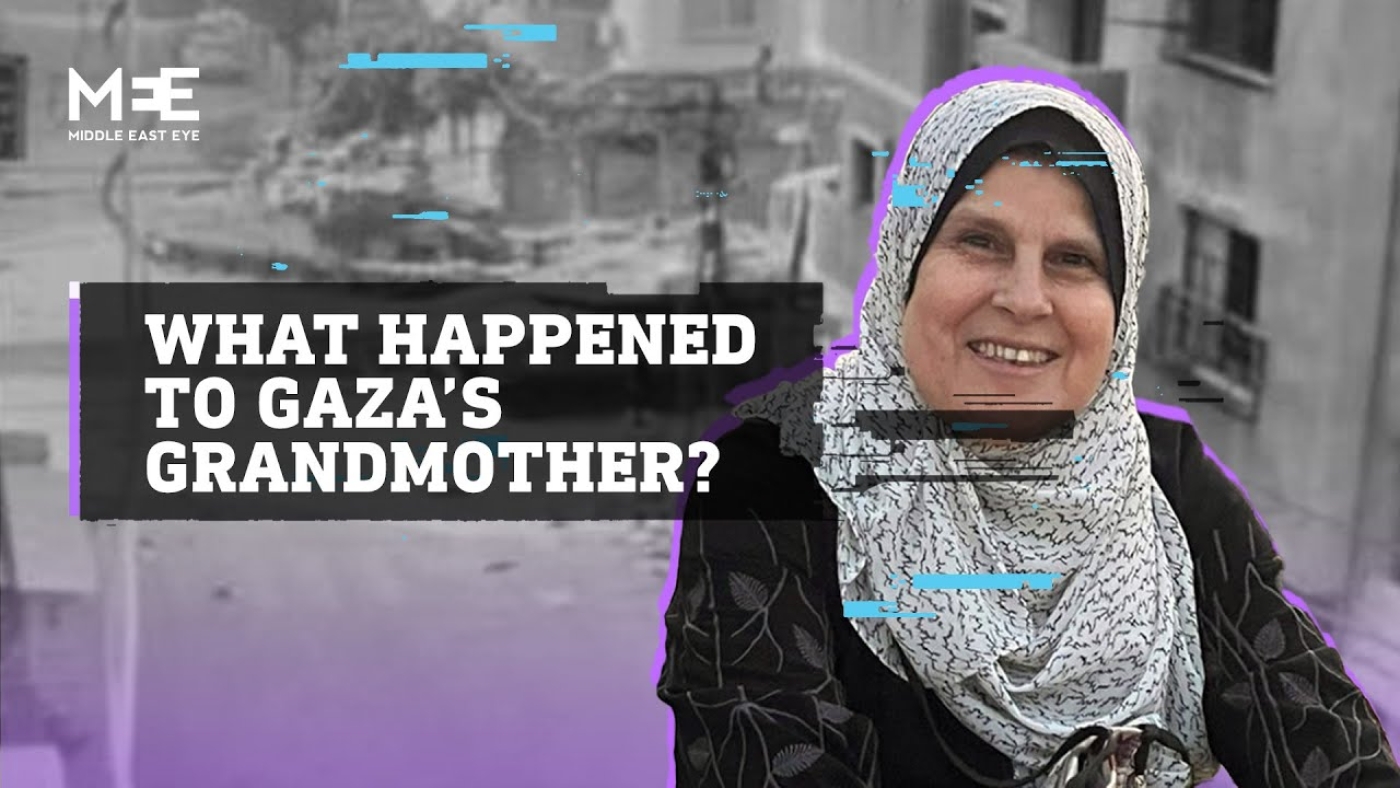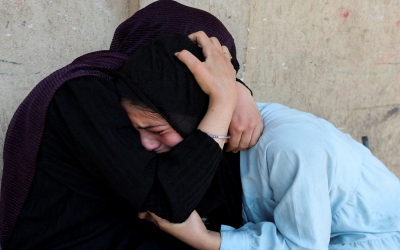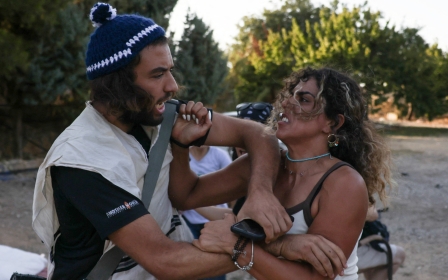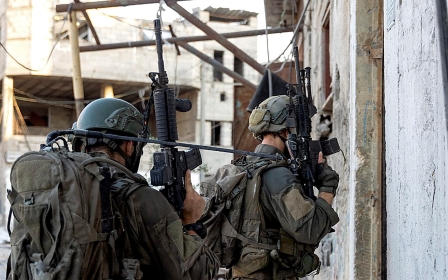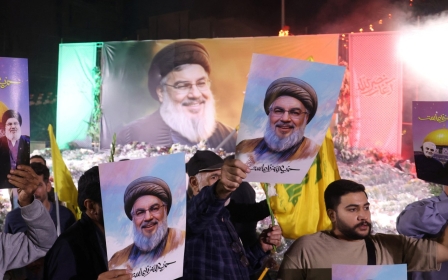What happened to the boy who saw his grandmother killed as he waved a white flag?
In a flash, everything changed for the Abd al-Aati family.
In early November, as Palestinians fled the Rimal neighbourhood of Gaza City following relentless Israeli bombardment, matriarch Hala grabbed her grandson Taim, who was holding a white flag, a universal symbol of surrender, and they tried to make their way south.
As they passed through an evacuation route that had been declared safe, the unthinkable happened. While holding her grandson's hand, a shot rang out and Hala collapsed to the ground.
According to exclusive footage of the killing obtained by Middle East Eye, Taim was seen running towards a group of people who had been forced to take a different route to reach safety. His parents stayed behind, trying to provide his grandmother with urgent medical aid.
This marked the beginning of a year of torment for the Abd al-Aati family, during which their lives became a roller coaster.
New MEE newsletter: Jerusalem Dispatch
Sign up to get the latest insights and analysis on Israel-Palestine, alongside Turkey Unpacked and other MEE newsletters
After being separated from his son for a staggering seven months and suffering countless rounds of displacement, Yousef Abd al-Aati recalled the fateful events of that day and described the impact of the separation and a year of war on his son.
"On 12 November 2023, the tanks reached our area and surrounded us, so we tried to flee. My mother-in-law was holding our son Taim’s hand, who was waving a white flag [as we crossed the street]. She was shot by a sniper and died immediately," Yousef Abd al-Ati told MEE.
"Amid the chaos of the situation, my son, Taim, was taken by some people who were also heading south and remained separated from us for seven months," he said.
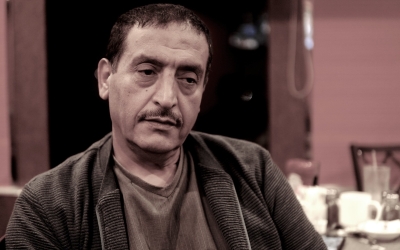
"Many people asked us: ‘Why don't you go to Taim in the south?’ But our biggest concern was the checkpoint. We heard many frightening stories about what happened at that checkpoint and we became paralysed when making a decision," he added.
A few weeks after the Israeli army issued its first displacement orders for residents of Gaza City and the northern Gaza Strip on 13 October, checkpoints were established on the main eastern and western roads leading south.
Residents had to be searched or interrogated before being allowed to evacuate. Those who tried to return from the south to the north were shot dead on the spot.
For the next seven months, Yousef, his wife, their other child, Ghaith and his father-in-law endured the suffocating Israeli-imposed siege on Gaza City, not knowing where their next meal would come from.
"We experienced things that would make one's hair turn white. And indeed, our hair turned white because of it. Those were months of siege, starvation, fear and anxiety," Yousef explained.
Reuniting with Taim took courage
Yousef said his family made several attempts to reunite with Taim, reaching out to the Red Cross and Red Crescent, among other organisations, but no one could help.
The family received donations through a crowdfunding campaign organised by volunteers to help them travel from Gaza through the Rafah border into Egypt.
Before the Israeli military seized the border in May, a company owned by an Egyptian businessman charged Palestinians crossing from Gaza’s Rafah to Egypt at least $5,000 per adult and $2,500 for children under 16 during the war.
As a result, hundreds of Palestinians, unable to afford the fees, organised crowdfunding campaigns to escape the military attacks in the blockaded strip.
'There are no words to describe the reunion with Taim. Praise be to God, who reunited us with him'
- Yousef Abd al-Ati, Taim's father
But even after securing the necessary funds, Yousef and his family still hesitated to undertake the perilous journey south.
"We were paralysed by the stories we had heard about the checkpoints. So many people were killed trying to cross them. We couldn’t make a decision," he said.
On 3 May, after months of separation, the family finally gathered the courage to head south and reunite with Taim.
"That journey alone was like a war in itself in every stage - before leaving, during the journey, and after," Yousef continued.
"The road itself was exhausting; the coastal road was completely destroyed. We passed through the checkpoint after the soldiers asked us several questions. The exhaustion was indescribable. We were terrified."
On the southern side of al-Rashid Street in western Gaza, the Abd al-Ati family was welcomed by locals and journalists who, by chance, had learned of Taim's story and offered to document the moment of their reunion.
"There are no words to describe the reunion with Taim. Praise be to God, who reunited us with him," Yousef said.
'Taim is not the same'
The family stayed in southern Gaza for three days before departing on 6 May, just one day before the border crossing was completely closed.
"The morning of 6 May was filled with tension, as there were many evacuations, and [the Israeli army] dropped many leaflets ordering the evacuation of Rafah. It became clear to us that the crossing would close and that day was the last time it would remain open," Yousef Abd al-Aati said.
"While we were at the Egyptian side of the crossing, we could still hear the sounds of shelling in Rafah and the south, and we saw leaflets falling on Rafah."
The Israeli military seized and closed the crossing on 7 May, only a few hours after Abd al-Ati and his family managed to cross into Cairo.
However, the reunion and their escape from Gaza brought little relief to the family.
They are struggling to obtain legal residency permits and enrol their children in schools in Egypt while Taim and his parents continue to grapple with the trauma.
"Taim and his brother Ghaith are at risk of losing another school year. After his mother started teaching him at home, we decided to enrol him in kindergarten so he could at least learn the basics, socialise and make friends, rather than stay home," he said.
But the child's mental scars run deep. His father described him as "emotionally unstable", constantly asking about death and destruction.
"Taim is not the same as he was before the incident. When we saw him, he was a completely different person, with a different mentality. His reactions are very troubling. Every night, he says he imagines things and would say: ‘The bullet went right over my head.’ His way of speaking has completely changed," Yousef said.
"When I show him a picture of someone, he asks: 'Is this person alive? Is this person dead? Is this house still standing?' All of his questions now revolve around whether people are alive or dead and he frequently asks: 'When will we see them again? Is grandma in heaven?'"
"Every night, he tells us that he sees the bullet that killed his grandmother. It went right over his head, and he still imagines it," Yousef said.
"It is very difficult for me to say this, but I believe he has developed psychological issues. But after all, even we [as adults] still think of what happened in Gaza as if it were happening in front of us today."
Middle East Eye delivers independent and unrivalled coverage and analysis of the Middle East, North Africa and beyond. To learn more about republishing this content and the associated fees, please fill out this form. More about MEE can be found here.


